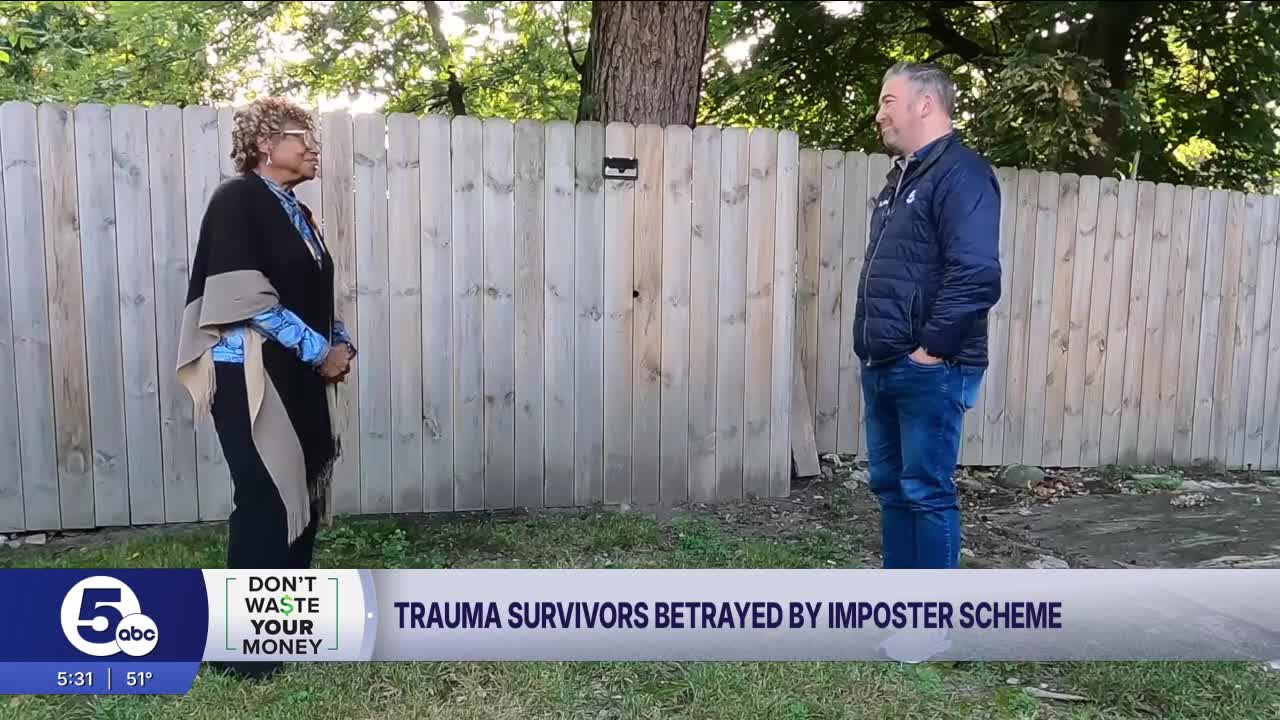CLEVELAND — While there are so many out there right now, there's one scam that continues to rapidly spike in cases. This heads up is so important because it's a strategy that could easily catch any of us off guard.
And I’ve talked about them a lot on Good Morning Cleveland: Imposter scams.
In 2024, they rose to the top spot in the fraud category with nearly 846,000 reports according to the Federal Trade Commission, resulting in a loss of about $3B, a 362% increase from 2020.
Two Northeast Ohio women, bonded by trauma, faced a new crisis together that left them vulnerable and taken advantage of when they needed help the most.
It started with a phone call in a moment of need.
"She said I'm just at my worst. I don't know what to do," said Lillian Lee.
That prompted Lee, a Seymour Avenue survivor, to rehome a green-cheeked conure, a small type of parrot, she raised by hand.
"All animals have that special, unique way that God gave them to make us feel OK. This is me gifting it to another trauma survivor," said Lee.
That survivor was Laura Cowan.
"She offered me Precious, like a support animal," Cowan said.
At the time, the Cleveland woman, who endured years of domestic violence, found herself struggling with a flood of emotions.
"Being a survivor of any type of trauma, you have flashbacks, you know, nightmares," Cowan said.
Cowan said it can all take a toll on your health, and she noticed a difference after she got Precious.
"Oh, man. My blood pressure went down, a little bit calmer," Cowan said.
The last two weeks have been anything but calm.
"I've been calling her name. Precious. Precious. Pretty girl," Cowan said.
Precious escaped as Cowan was walking into her home.
"And she flew straight into our backyard, a big tree," Cowan said.
Cowan immediately called Lee for guidance on what to do.
"I contacted every person known to man that can be able to get her out of that tree," said Lee.
Lee and Cowan turned to social media, posting a picture of Precious and what happened.
"We were at the mercy of others. We couldn't climb the tree," Lee said.
A short time later, they were contacted by a pet rescue company through that social media post.
“She said, well, they do want a deposit upfront before they come, and they'll head straight out once it's confirmed," Cowan said.
Cowan sent $100 via Apple Pay. A 45-minute arrival window turned into two hours.
Then the company called, claiming the truck got a flat tire and they needed $110 for a replacement.
"And I said no, we've been scammed," Cowan said.
The person they were dealing with was pretending to be a legitimate business.
“Yeah. We looked at their page. The pictures were great. They had a whole team. Wow, this is awesome," Cowan said.
The information Cowan and Lee found online was copied from a legitimate pet rescue company's site.
"All they need to tell you is one thing, send me money first. Don't. Don't," said Lee.
In my consumer reporting over the years, I’ve learned that when you are in the moment of a crisis, with emotions elevated and the clock ticking, scammers will take advantage of you.
"That's right. And they offer, you know, everything in the world to you. And you want to hear it," Cowan said.
The delay in dealing with the imposter company gave Precious time to move out of sight.
"They really don't understand how bad they really hurt somebody," said Lee.
As Cowan waits to see if she can get any of her money back, Lee is ready to help fill the void in her friend's heart.
"I will gift her, when it's time, another one because I know she's a good person, and I know she loved that bird," said Lee.
I learned that the pet search and rescue group that was impersonated is based in Florida, but it has clients across the country.
I spoke with the owner, and she informed me that someone had copied her content and then used it to create a fake business page on Facebook.
"They just came in and stole it. And then they started contacting people pretending to be my business. And then when people responded, they kept conversations on direct message on Facebook and text message, never providing personal information, never talking on the phone," said Annalisa Burns, Pet Search and Rescue.
So, what can we do as consumers to protect ourselves?
While spotting these bogus businesses can be tough, there are a few things to remember.
First, do not click on links or call numbers sent to you in a message you weren't expecting. Second, contact the business or organization using a verified phone number, website or email. Finally, watch out for blurry images on a website or strange area codes on a text or call.
Watch more on how to spot an imposter scam below:
RELATED: How to avoid imposter scams
Remember, impostors use government agencies like the IRS, local police for missed jury duty, airline customer service and the Ohio Turnpike to scare money out of people.
These just scratch the surface when it comes to the many schemes we continue to see.
Take the few extra minutes to do your homework.





